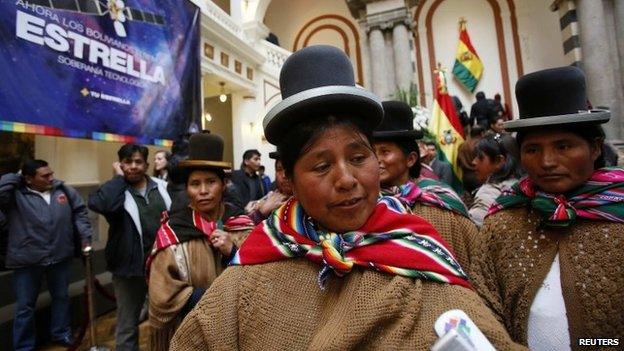First Bolivian telecom satellite enters service
- Published

The ceremony marking the satellite's start of operations was attended by indigenous leaders
Bolivia's first telecommunications satellite has started operating.
The satellite is expected to provide internet and mobile phone connections to the estimated 3.3 million Bolivians in areas currently not connected to the telecommunications grid.
President Evo Morales said that thanks to the satellite, the price of internet, TV, and mobile phone services would go down.
It was launched in December from China's Xichang Space Centre.
Named Tupac Katari after an 18th-Century indigenous leader who fought Spanish colonial rule, the satellite is orbiting the earth at a height of 36,000km (22,400 miles).
Price drop
It took up its commercial operations on Tuesday after a three-month trial period, with national telecommunications firms Entel and Bolivia TV starting to use its services.
Over the coming weeks, the rest of the 15 national companies which have purchased some telecom space are also expected to begin using it.
At the inauguration ceremony, President Morales said that the cost of mobile phone costs in Bolivia would now fall by approximately 20%.
Calls in Bolivia would now be cheaper than in neighbouring countries such as Argentina, Brazil, Chile, Ecuador and Peru, the president said.
The Bolivian Space Agency said the entire satellite programme cost just over $300m (ÂŖ180m), most of which was financed with a loan from the China Development Bank.
The agency is also planning to launch an Earth observation satellite in 2017 to survey natural resources from orbit.
- Published24 May 2013
- Published22 April 2013
- Published2 October 2012